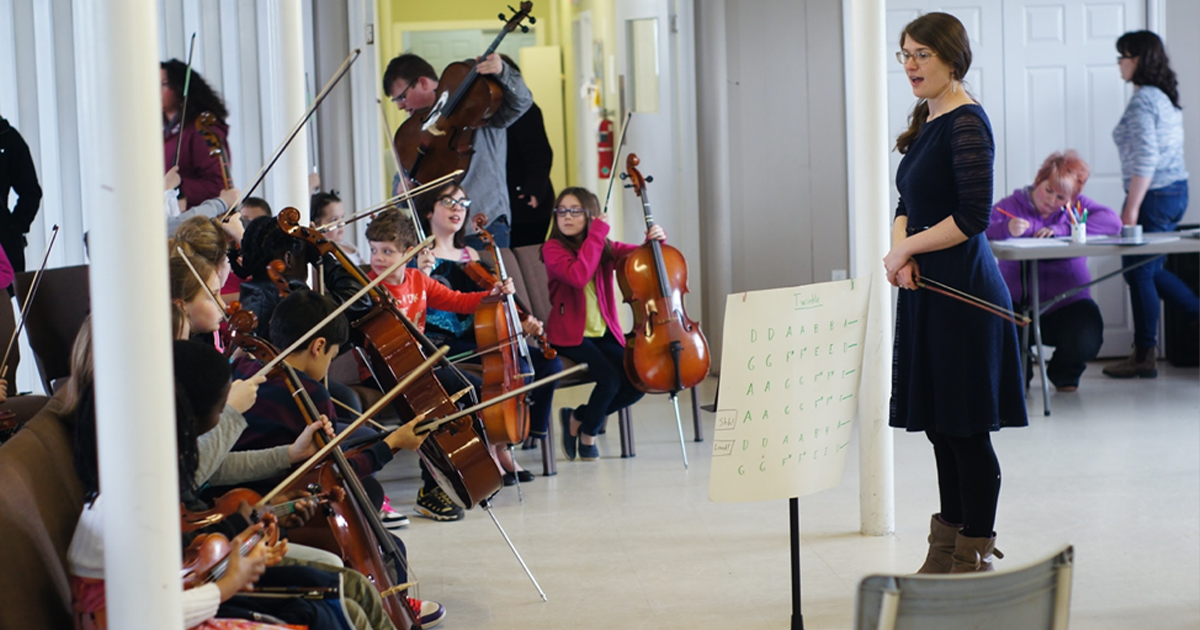Strong Harbour Strings

Written by Maggie Burton, (WeavEast Fellow Newfoundland and Labrador)
Strong Harbour Strings is a mentoring artist program based in St. John’s, grounded in the belief that communities are strengthened through the learning and sharing of music. They strive to create equal access to music education and performance for young people residing in low-income neighbourhoods through experiential learning and relationships that allow time and space for meaningful mentorship to take place. The goal is to foster transformative experiences through music for everyone involved in the program, from the students and their families to the teaching faculty members.
I interviewed Carole Bestvater, director and founder of the program.

Maggie Burton: Where did the idea come from/what are you modelling after?
Carole Bestvater: “SHS is directly modelled after a program in Rhode Island called Community MusicWorks. Right after graduating from my undergrad degree, I started a two year Fellowship position for Community MusicWorks. I had known about CMW since reading an article about the organization years before, so it really felt like a dream come true to have the opportunity to work there. The fellowship at CMW laid the foundation for starting Strong Harbour Strings in St. John’s.”
Maggie Burton: Can you give me a timeline for the program with the history and its evolution?
CB: the genesis of this program was a partnership with the Newfoundland Symphony Youth Orchestra in September 2013. I approached the youth orchestra with my idea for an after school social program, and they were eager to help support, leading to the establishment of the Suncor Energy Strings Program. In June 2015, the funding from Suncor came to its scheduled conclusion. At that point, the program was rebranded as the non-profit Strong Harbour Strings, and started operations as an independent organization in September 2015. We maintain a positive rapport with the youth orchestra (now the Calos Youth Orchestras), and are thankful for the help and support that they provided in the beginning stages. Strong Harbour Strings focuses primarily on individual and small group interactions, supporting the young musicians in a variety of different learning experiences. There are currently 38 students between two centres (Buckmaster’s Circle and Shea Heights), and we plan to continue growing!
Maggie Burton: Why are you doing it?
Carole Bestvater: many years ago, my mother casually said to me, “If I was raising you and your siblings in today’s economy, there would be no way that we would have been able to afford music lessons!” She didn’t realize how much impact that statement would have on me. Music is something that is universal, and something that can be transformative in any number of ways. Unfortunately, music lessons are often too expensive for families to afford. We create an equal playing field financially in order to provide opportunities for families who wouldn’t otherwise be able to afford lessons. I do this because I see how important this program is to the students who continuously make the commitment to be part of it.
Maggie Burton: What social change are you making/hoping to make?
Carole Bestvater: The legacy I hope to leave for everyone who comes through the doors of SHS is a love for creating and sharing music, and the ability to think critically about our communities and social environments.
Maggie Burton: What’s the future look like for SHS?
Carole Bestvater: The future of SHS will be shaped by our most important stakeholders: the students. We spend a lot of time and energy obtaining reflection and feedback from the students, and make adjustments based on their feedback and the faculty’s pedagogical approaches. We plan to continue collaborating and growing, and creating opportunities to share music with our communities!
What could other music organizations learn from Strong Harbour Strings? A practical piece of learning specific to other music education practitioners is their commitment to building relationships that last from early in a student’s school years through to high school, and their desire to adapt the program to meet the needs of students along the way. As a musician, I admire their refusal to become a teaching organization that is stuck in its ways, and their commitment to the skills development of their teaching faculty members as well as the students. For the non-musician, SHS is an example of music education that can be a powerful tool for community-building when it is grounded in strengthening relationships.
Read more about them at https://strongharbourstrings.com/.
Share this:
Comments are closed